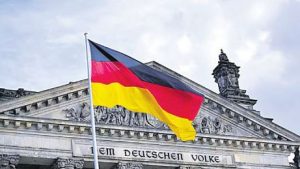German Challenge

With the assumption of office by Christian Democratic Union (CDU) leader Friedrich Merz as Chancellor of Germany 6 May, Europe’s attempts at consolidation against the belligerence and trade war by US President Donald Trump takes concrete shape. The first step towards this effort was the signing off on a coalition deal by the country’s main Centre-Right and Left parties the previous day. The CDU, Social Democratic Party (SPD), and Bavaria-only Christian Social Union (CSU) signed the agreement spelling out the new government’s programme.
A key point of agreement is to isolate the Far-Right Alternative for Germany (AfD), which came second in the vote. The new government has a well-defined task to revive Germany’s ailing economy which has become all the more complicated by Russia’s invasion of Ukraine and Trump’s erratic policies on European security and global trade.
Merz has promised to curb irregular migration in a clear attempt to stop the rise of the AfD, which has been designated by Germany’s intelligence services as an extremist group. The outfit already stated it had filed a lawsuit against the government agency.
Predictably, the designation has drawn criticism from US officials with US Secretary of State Marco Rubio branding it “tyranny in disguise.” The Trump administration has been extending support to the AfD.
The need of the hour for Germany is strong, well-planned and dependable governance. As Merz told his countrymen these are times of profound change, upheaval and great uncertainty. He has promised his government is determined to move Germany forward with reforms and investments. It will be a government, to use his words, “whose voice is heard in Europe and the world.”
The outgoing coalition government of SPD Chancellor Olaf Scholz collapsed on 6 November last year, the day Trump was re-elected to the White House. This time Scholz himself will not be part of the new cabinet, but will stay on in parliament as a lawmaker.
Germany is now at the crossroads of history. The postwar promise of Wohlstand für Alle (prosperity for all) is slipping away, with soaring inequality and a fifth of Germans in the grip of poverty or social exclusion. While the east-west divide persists, a new crisis plagues the working class and roads and railways are crumbling.
Digital infrastructure is behind the times and the education system is struggling to equip a shrinking workforce for the demands of an evolving economy. The country’s industrial base is also eroding under high energy costs, outdated technology and a mindless bureaucracy. The once dominant car manufacturers are facing growing competition from China, whereas Trump’s trade wars have made the economy’s dependence on exports vulnerable. On top of it, Russian President Vladimir Putin’s aggression is forcing Germany to confront the threat of war.
Merz himself is also a bundle of contradictions. Earlier, he had courted the AfD, but in post-poll realignment he ruled out having any truck with it. Again, during the polls he campaigned for fiscal restraint, but then made an abrupt U-turn on debt financing by hastily pushing constitutional reforms with the Social Democrats and the Greens to unlock hundreds of billions of euros in borrowing for defence and infrastructure.
Of course, politics is an art of reconciling the opposites and Merz is demonstrating that he has considerable skill in it. Many in Germany are keeping their fingers crossed as to how he will guide the country in particular and Europe in general in facing internal and international challenges. The defeat of pro-Trump political leaders and parties in the just concluded national elections in Canada, Australia and Singapore certainly raises hope among countries such as Germany, France and the UK that they may together prevent the US’ goal of resetting the international economic order.
News